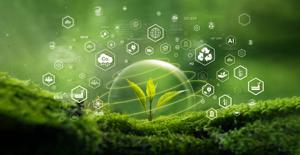
News
November 02, 2025
AI can help the environment, even though it uses tremendous energy. Here are 5 ways how
AI raised concern over its tremendous consumption of water and power, but scientists are experimenting with ways AI can help people and businesses use energy more efficiently and pollute less.
**AI: A Surprising Ally in the Fight Against Climate Change?**
Artificial intelligence (AI) has rapidly transformed various aspects of our lives, but its substantial energy demands have raised concerns about its environmental impact. While the training and operation of AI models require significant power and water resources, scientists and engineers are exploring innovative ways to leverage AI itself as a tool to combat climate change and promote sustainability.
The paradox of AI potentially saving the planet while simultaneously consuming vast resources is a challenge researchers are actively addressing. The focus is shifting towards developing AI applications that can optimize energy consumption, reduce pollution, and promote more sustainable practices across various industries.
One promising avenue is using AI to improve energy efficiency in buildings and infrastructure. AI algorithms can analyze real-time data on energy usage, occupancy patterns, and weather conditions to optimize heating, ventilation, and air conditioning (HVAC) systems. By predicting energy demand and adjusting settings accordingly, AI can significantly reduce energy waste and lower carbon emissions.
Another area where AI is making a difference is in optimizing transportation and logistics. AI-powered route planning and traffic management systems can minimize congestion, reduce fuel consumption, and lower emissions from vehicles. Furthermore, AI is playing a crucial role in the development of autonomous vehicles, which have the potential to further improve fuel efficiency and reduce accidents.
The manufacturing sector is also benefiting from AI-driven solutions. AI can analyze production processes, identify inefficiencies, and optimize resource allocation to minimize waste and energy consumption. Predictive maintenance, powered by AI, can prevent equipment failures, reducing downtime and extending the lifespan of machinery, ultimately leading to lower energy use.
Beyond these specific applications, AI is also being used to improve weather forecasting and climate modeling. More accurate predictions can help communities prepare for extreme weather events, manage water resources more effectively, and develop more resilient infrastructure. Improved climate models can also inform policy decisions and guide efforts to mitigate the effects of climate change.
Finally, AI is being used to accelerate the development of renewable energy sources. AI algorithms can optimize the design and operation of solar panels and wind turbines, increasing their efficiency and reducing their cost. AI can also help integrate renewable energy sources into the grid more effectively, ensuring a stable and reliable power supply.
While the energy consumption of AI remains a valid concern, these examples demonstrate the tremendous potential of AI to contribute to a more sustainable future. By focusing on developing and deploying AI applications that promote energy efficiency, reduce pollution, and support the transition to a clean energy
Artificial intelligence (AI) has rapidly transformed various aspects of our lives, but its substantial energy demands have raised concerns about its environmental impact. While the training and operation of AI models require significant power and water resources, scientists and engineers are exploring innovative ways to leverage AI itself as a tool to combat climate change and promote sustainability.
The paradox of AI potentially saving the planet while simultaneously consuming vast resources is a challenge researchers are actively addressing. The focus is shifting towards developing AI applications that can optimize energy consumption, reduce pollution, and promote more sustainable practices across various industries.
One promising avenue is using AI to improve energy efficiency in buildings and infrastructure. AI algorithms can analyze real-time data on energy usage, occupancy patterns, and weather conditions to optimize heating, ventilation, and air conditioning (HVAC) systems. By predicting energy demand and adjusting settings accordingly, AI can significantly reduce energy waste and lower carbon emissions.
Another area where AI is making a difference is in optimizing transportation and logistics. AI-powered route planning and traffic management systems can minimize congestion, reduce fuel consumption, and lower emissions from vehicles. Furthermore, AI is playing a crucial role in the development of autonomous vehicles, which have the potential to further improve fuel efficiency and reduce accidents.
The manufacturing sector is also benefiting from AI-driven solutions. AI can analyze production processes, identify inefficiencies, and optimize resource allocation to minimize waste and energy consumption. Predictive maintenance, powered by AI, can prevent equipment failures, reducing downtime and extending the lifespan of machinery, ultimately leading to lower energy use.
Beyond these specific applications, AI is also being used to improve weather forecasting and climate modeling. More accurate predictions can help communities prepare for extreme weather events, manage water resources more effectively, and develop more resilient infrastructure. Improved climate models can also inform policy decisions and guide efforts to mitigate the effects of climate change.
Finally, AI is being used to accelerate the development of renewable energy sources. AI algorithms can optimize the design and operation of solar panels and wind turbines, increasing their efficiency and reducing their cost. AI can also help integrate renewable energy sources into the grid more effectively, ensuring a stable and reliable power supply.
While the energy consumption of AI remains a valid concern, these examples demonstrate the tremendous potential of AI to contribute to a more sustainable future. By focusing on developing and deploying AI applications that promote energy efficiency, reduce pollution, and support the transition to a clean energy
Category:
Politics